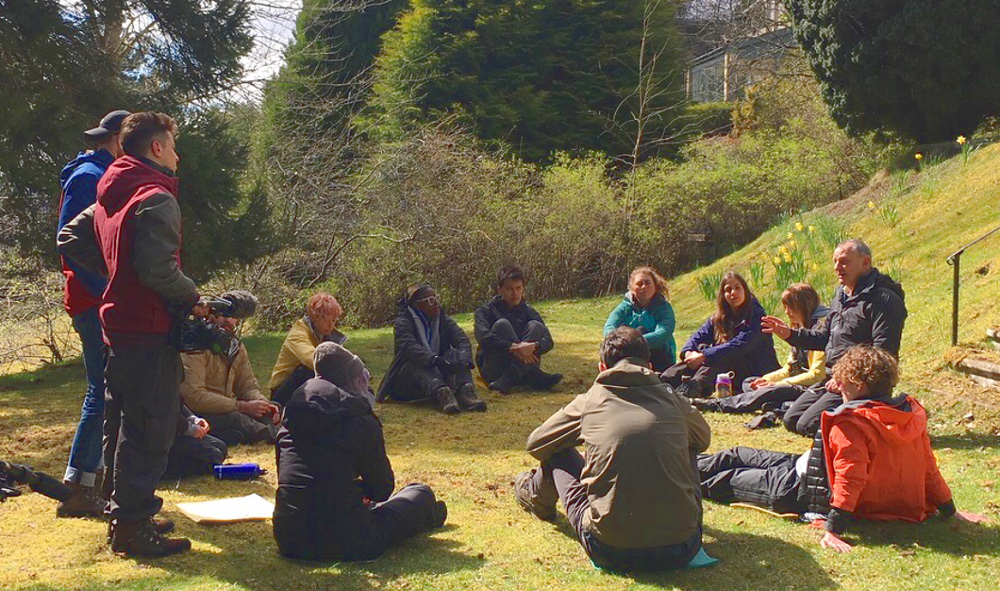
This video blog post provides a snapshot of some of the teaching and learning that takes place on a Masters course, Outdoor Environmental Education: Concept-Based Practice, run by Robbie Nicol in the School of Education…
The course takes place at Woodlands, the University’s residential centre in the Highland village of Kingussie, located within Cairngorms National Park. In this course, the teaching and learning is interdisciplinary and rooted in the emerging concept of place-based education, which is an educational response to global problems that are grounded in local phenomena, such as climate change. Designing the course so that it is delivered locally, at Woodlands, provides enhanced and unique learning opportunities as a result of deep immersive experiences in landscapes. Robbie’s written blog that follows highlights the key messages that the video aims to make visible.
As we are living in a time of ecological, humanitarian and planetary crisis, we desperately need to develop approaches to teaching and learning within both the sciences and humanities that do not end up objectifying this crisis as someone else’s problem. Rethinking forms of education to help students live and act in this changing world are now essential. As such, I take the view that students are not passive receptors of knowledge but that their learning should encourage them to be active change agents (Nicol, 2014a; Nicol 2014b).
The video starts with me quoting Aldo Leopold (1989: 214) who said that “we can be ethical only in relation to something we can see, feel, understand, love, or otherwise have faith in”. I believe that the moral significance of our relationships with outdoor places are determined by direct proximity and the experiential engagement we have with them. These ideas come from the theoretical position of phenomenology, which celebrates knowledge that comes from all our senses. This is not an anti-intellectual or anti-theoretical position; it is more simply to recognise the importance of engaging directly with places and the people that inhabit them and not viewing these relations from a distance.

When we see and hear the students gathered around the oak tree I am trying to deepen their phenomenological engagement and relationship with what Abram (1997) calls the ‘more-than-human’. The educational principles are based on the essential need for epistemological diversity, or, more simply, different ways of knowing. The students will already have read papers about climate change, species extinction, famine, and a host of other fairly depressing subjects. I want to recognise the severity of these issues but not dwell in their misery and the paralysis they may elicit. I am trying to find joyful ways for the human spirit to flourish and act energetically and creatively on the world. Georgie explains this well when she talks about getting angry at the world but at the same time admiring the tree’s beauty. The poem that Dominic reads is the culmination of several carefully structured visits to the oak tree designed to develop reciprocity with the more-than-human.
Whilst my teaching involves a series of planned events there is always room for spontaneity. When you see the students rolling down the hill it is fair to question what sort of learning they might be engaged in – after all, this is not just a supplementary field trip but a credit-bearing Masters course. I did not ask them to do that; it emerged as a spontaneous act. Respecting this spontaneity is important when encouraging students to become active change agents. In the video, Smaragda and Clifton capture this sentiment well when they explain how we are engaged in co-constructing a learning community together, and that there is a dynamic relationship between me and them and how we engage in teaching and learning.
When spontaneous events like this occur, they are treated in the same way as any of my planned teaching events. Frequently we pause to reflect on our thoughts and feelings to work out how we can develop better, deeper and more meaningful educational responses to the planetary crisis. If fun and playfulness emerge from this process then I encourage that, not least because at the same time we will be engaged in critical discussions about our individual and professional ethical responsibilities. These discussions can be profoundly challenging and unsettling so it is important that, whilst we create a learning culture that encourages activism, it remains rooted in principles of tolerance, respect and peace. These principles are encouraged through the type of community living that is possible at our residential centre Woodlands. Here, students from very different backgrounds spend time debating and learning whilst cooking wholesome locally bought food, eating together, and sharing dormitory accommodation.
At the end of the video I say that it is a privilege to be a teacher in the University. What do I mean by this? The ecological, humanitarian and planetary crisis I mention are also an educational crisis. When Einstein warned that problems cannot be solved from the consciousness that created them, I understand this to mean that we need to interrogate and change the sorts of current educational practices that have led to these crises. In my own work, I am exploring the limitations of the placeless education that happens indoors when boundaried by walls and clocks. The privilege comes from working for a School in the University that is actively supporting crossing boundaries in search of innovative teaching and learning practices.
With special thanks to Scott Willis and Vicki Bell from the University of Edinburgh’s Communications and Marketing department who filmed, produced and edited this video exclusively for Teaching Matters.
References
Abram , D. (1997) The Spell of the Sensuous. New York: Vintage.
Leopold, A. (1989) A sand county almanac: and sketches here and there (special commemorative edition). Oxford: Oxford University Press.
Nicol, R. (2014a) Entering the Fray: The Role of Outdoor Education in Providing Nature-Based Experiences that Matter. Educational Philosophy and Theory 46 (5), 449-461.
Nicol, R. (2014b) Fostering environmental action through outdoor education. Educational Action Research. 22(1), 39-56.



Still challenging folk with nature?